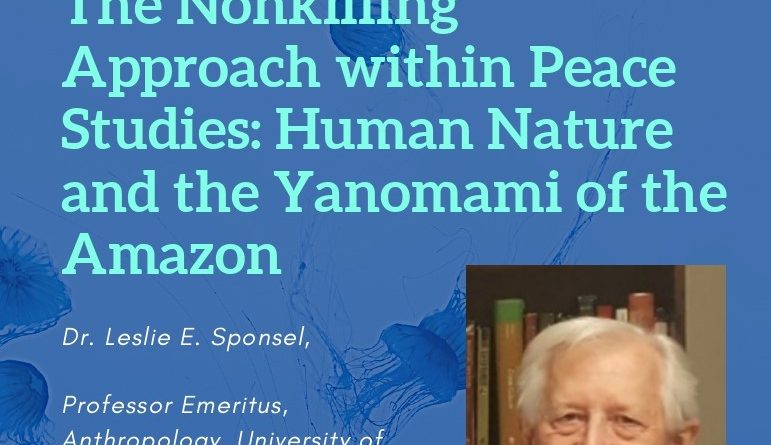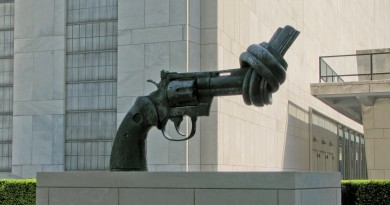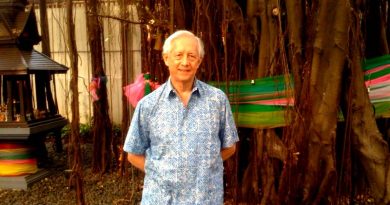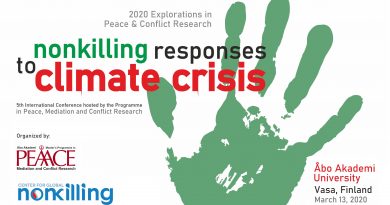The Nonkilling Approach within Peace Studies online seminar
The Latin America & Caribbean Working Group (LACWG) at the Department of Conflict Resolution, Nova Southeastern University, is organizing an online seminar on the theme “The Nonkilling Approach within Peace Studies: Human Nature and the Yanomami of the Amazon”, with Professor Emeritus Leslie E. Sponsel, author of the recent CGNK book Nonkilling Anthropology. The event is open to the public and will take place via Zoom (metting ID: 952 6121 8647) on April 8 at 12 pm EST. Roland Joseph, President of the LACWG, and Elena Bastidas, Adviser of the LACWG, will serve as moderators.
During the seminar, the pioneering research of political scientist Glenn D. Paige in developing the nonkilling approach within peace studies will be introduced. Then his nonkilling approach is applied to the anthropological study of war and peace. The Hobbesian political ideology of human nature as inherently and inevitably violent and warlike is critically analyzed and refuted. Evidence from archaeology and ethnography reveals that war is very recent in human prehistory and uncommon. As a case example, the seminar will explore the Yanomami. The Yanomami of the Amazon have been characterized as a primitive tribal society engaged in chronic endemic warfare. This view has been repeated regularly and uncritically in the Hobbesian echo chamber. Application of the nonkilling approach to reconsidering the Yanomami refutes this characterization and provides a new perspective on their culture. Thereby it challenges Hobbesian political ideology as well.
Leslie E. Sponsel earned a B.A. in geology from Indiana University, and M.A. and Ph.D. from Cornell University specializing in biological anthropology. In 1981 he was hired at the University of Hawai`i (UHM) to develop and direct an Ecological Anthropology Program. Among the courses he teaches is ANTH/PACE 345 Aggression, War and Peace. He was one of the founding members of the Spark M. Matsunaga Institute of Peace at UHM and a contributor to the development of the independent Center for Global Nonkilling (https://nonkilling.org/center/). Also, he was a founding member and the first chair of the Committee for Human Rights of the American Anthropological Association. From 1974-1981 through several field trips to the Venezuelan Amazon he studied the behavioral ecology of animal predation by Yanomami and other Indigenes. Thereafter he turned to Thailand for research on Buddhist ecology and environmentalism, more recently on sacred caves. Among his books are The Anthropology of Peace and Nonviolence, Spiritual Ecology: A Quiet Revolution, Nonkilling Anthropology: A New Approach to the Study of Human Nature, War, and Peace, and Yanomami in the Amazon: Toward a More Ethical Anthropology Beyond Othering.
Roland Joseph (Moderator) is a Ph.D. candidate in Conflict Analysis and Resolution at Nova Southeastern University (NSU). He is interested in investigating the experience of scholars promoting the nonkilling paradigm to anti-nuclear weapon activists and nuclear realists and to what extent this new paradigm can contribute to addressing the risks associated with the existence of nuclear arsenals. Mr. Joseph is a member of the Nonkilling Security and International Relations Research Committee at the Center for Global Nonkilling (CGNK). In Haiti, his own country, he coordinated and led training sessions on peace, nonviolence, nonkilling, and conflict resolution for more than ten years at Centre Caraibbeen pour la Non-Violence Globale et le Developpement Durable (Caribbean Center for Global Nonviolence and Sustainable Development). Since January 2022, he has served as the President of the Latin American and the Caribbean Working Group (LCWG) of the Department of Conflict Resolution Studies at NSU under the supervision of Dr. Elena Bastidas. At NSU, he was a teaching assistant (TA) to Dr. Bastidas in different courses, including Dissertation Preparation and Quantitative Research. Before moving to the U.S. in 2013, he worked as a journalist and political analyst for various Haitian radio stations and newspapers for over fifteen years. He holds a Master of Arts in peace and conflict studies from The University of Massachusetts Lowell, a Master of Science in conflict analysis and resolution from NSU, and a bachelor’s degree in political science.




